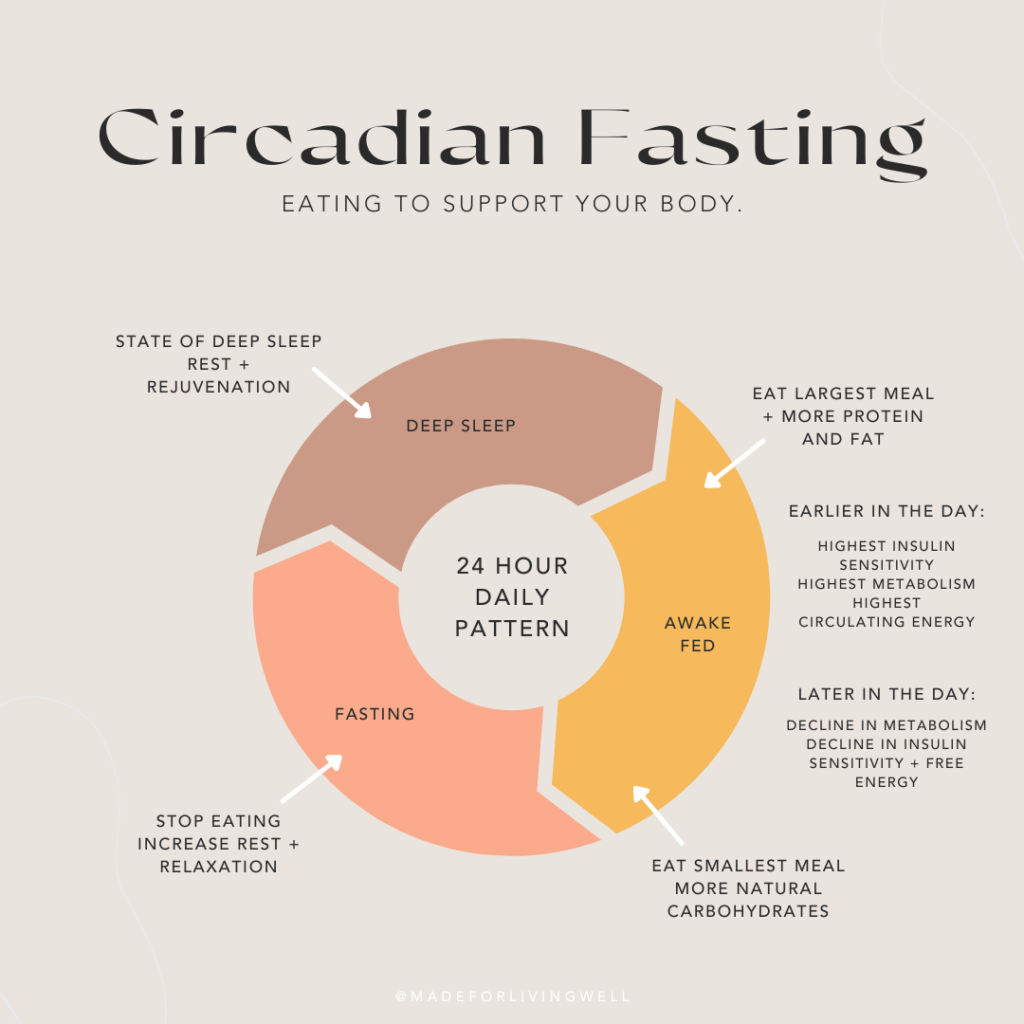Intermittent fasting has been a trendy health practice, but how is it affecting your body? I’ve been asked the question, Is intermittent fasting bad for metabolism? I wanted to take some time to answer that scientifically and practically. Learn the answer inside!

Fasting is one of the oldest recorded health practices. Arguably it has been around since the beginning of creation, first noted as a religious practice more than a health practice. But even most religious traditions have incredible health benefits. Like prayer, singing, connecting, and seeing beyond yourself. I’d love to dive into all these at some point, but today we will talk about intermittent fasting.
There seems to be controversy popping up with intermittent fasting, questioning if it’s harming your metabolism forming two camps of people. One camp is those who follow a strict fasting protocol. The other believes you should eat when your body is hungry regardless of timing.
Honestly, there is valid information on both sides. But this information feeds the confusion that already exists in this space. On this podcast, I dive into the science on both sides, working to find a common balance. Get the full details answering the question, is intermittent fasting bad for your metabolism, inside the podcast.
Is Intermittent Fasting bad for metabolism?
There is no doubt I have a deep fondness for the metabolic way of eating (take my mini-course on metabolic eating here). But like all ways of life, we tend to take what is good and push it to the extreme, just like those who follow intermittent fasting. A healthy practice of fasting for 12 hours has turned into fasting for 18 hours and sometimes 20 on any given day. We have whittled the eating window to just four hours every day.
But what we have to know, there is a benefit to eating and a benefit to fasting. Both serve a larger purpose and one we should respect – working with our body to support healthy conditions inside our system. Like day and night, you need a fed and fasted state inside the system.
How long that fasted window and fed window brings a bit more controversy.
In the article, Is Intermittent Fasting Health – Here’s a Better Option, I show intermittent fasting isn’t just about limiting your food intake. The purpose of intermittent fasting is to provide adequate space throughout the 24-hour day for your digestive system to rest, increasing your healing and rejuvenating phase of deep-restorative sleep. Without deep restorative sleep, which is affected by food and light, your body’s hormonal pathways, enzymatic processes, and healing properties do not reset. This creates a cascade of negative conditions that affect your body for days or weeks.
Fasting is critical to the health of the body. The question is not whether to fast but how long.
How long should you fast?
Like anything, intermittent fasting can be great for your system or incredibly damaging. How long you fast determines the health benefit. Like any health tip, the key is balance. Overeating over long periods throughout your life are just as damaging as undereating or fasting for long periods throughout your life.
What balance looks like is going to be personal from person to person. Although some foundational points can help you get started.
First, fasting should and will look different between sexes. Men tend to thrive on more stress and, therefore, can fast for extended periods each day and experience significant benefits. If you are a male, fasting for 12-16, potentially even slightly longer, has been shown to decrease blood pressure, increase insulin sensitivity, energy, hormonal flow, and boost brain power.
However, for women, especially cycling women, longer fasting windows can be detrimental to your hormonal flow, decreasing energy, increasing insulin resistance, and sending out a stress response. A woman in her reproductive years will be threatened by a lack of energy provided by food and respond as if a threat is present. For a cycling woman, fasting 12-14 hours a day may be your max.
Post-menopausal women tend to handle stress better, benefitting from a longer fast.
The most critical element in all healthy practices is to ensure it’s healthy for you. Pay attention to how your body responds. But most people need 12 hours of rest each day, opting for a 12-hour fasting window. That means you eat all your meals in a 12-hour period (which is entirely realistic) and fast the rest.
The goal is not to over-fast or under-eat in your fed window. Both situations can rapidly deteriorate your metabolism. But on the flip side, eating enough at the correct times can significantly boost your metabolism.
Fast, but don’t neglect for how long and when you do so.
When should you fast?
When you eat and when you fast are arguably more important than what you eat. I know that is a bold statement in a world fixated on food, but food doesn’t have as much power as we give it.
Health is a metric of how your body responds to food and all things in life. How your body responds is dependent on the cyclical pattern of your body.
Everyone’s body has a unique cellular pattern. Of course, we can’t neglect our bodies also have hormone cycles, with women cycling on a 28-day cycle and men cycling on a 24-hour one. But even outside reproductive hormones, researchers have found 80% of your cellular DNA fluctuates with your circadian clock – a system dependent on fed and fasting windows.
When you understand this pattern, it makes sense that your body has a preferred time to eat and time to fast.
The science behind intermittent fasting
There was a unique and profound study on the effects of meal time and weight loss. Not that I believe health is consistent with weight loss. But the study gives good insight into meal timing and its effect on metabolism.
It’s a new field of health called chrono-nutrition that looks beyond just nutrients and calories to understand how meal timing plays a role in a person’s weight, appetite, chronic disease status, and ability to burn and store fast.
Research published in Obesity Reviews studied a group of people who were assigned to follow diets where they consumed most of their calories earlier in the day. They found those who ate earlier lost more weight than those who did the reverse. They also improved their blood sugar, cholesterol levels, and insulin sensitivity.
In another study published in Cell Metabolism, scientists examined what happened between a group of participants who ate the same meal earlier in the day (between 8:00 am and 4:00 pm) and a few weeks later, they consumed the same diet but later in the day (between 2:00 pm and 9:00 pm).
Despite eating the same foods and maintaining the same level of physical activity, participants were significantly hungrier when they followed the late-eating schedule and increased in weight. The study found that eating later caused participants to burn less fat and fewer calories, pushing their bodies to store more fat.
Meal timing matters to the health of your body. When you eat changes what your body does with what you eat.
The Answer: Circadian Fasting

Circadian fasting means you eat based on the sun cycles. As the sun rises, so does your metabolism, increasing your ability to digest and use food – decreasing GI problems and weight gain.
The circadian clock of your cells and rhythms of your hormones also proves breakfast and lunch should be the largest meals of the day while significantly decreasing how much food you consume as the sun sets. Ideally, you move your fed state to earlier in the day, breaking your fast one to two hours after waking up and starting your fast three to four hours before bed.
Eating earlier in the day improves digestibility and the usability of the nutrients you consume. Over time, it will lead to a decrease in weight, inflammation, and an up-regulation of your immune response, energy patterns, and overall well-being.
If you want to support your metabolism, fasting can help but only when done during the correct period throughout the day.
Tips To Heal Your Metabolism while Intermittent Fasting
Too often, big diet claims like intermittent fasting push the body to the extreme, leaving it out of balance. In the end, doing more harm than good. But that goes for anything that pushes the body to the extreme. The goal is always energy balance.
If done correctly, intermittent fasting can create balance through detoxification that happens during the fasting state. But only if you emphasize that fasting works only to the degree, you break your fast. The first meal post-fasting is the most critical of all. Don’t neglect these quick tips to heal your metabolism and benefit from intermittent fasting.
- Never skip breakfast. It should be a well-rounded meal containing all the macronutrient groups.
- Eat most of your food between breakfast and mid-afternoon when the sun is at its highest point.
- Don’t neglect carbs and protein. They are needed to supply energy, especially earlier in the day.
- Make your last meal your smallest meal. Avoid evening snacking and quit eating three hours before your bedtime.
- Eat enough. Intermittent fasting is not a practice of eating less but being well-fed over less time. Make sure you are eating enough and pay attention to your hunger cues. If you’re starving before bed, most likely, you didn’t consume enough all day. Re-evaluate and re-regulate based on what your body needs.
It will take time training to understand the length of your fasting and fed window. It will also take time for your body to readjust to this way of life.
Start slowly. First, evaluate how many hours you currently stay in the fasted state and how many hours you consume food throughout the day. If your fed window is 14 hours, try backing that up 30 minutes every day until you reach your desired goal.
Do you need help fixing your metabolism?
Do you feel tired? Have difficulty losing weight? Struggle with PMS, infertility, or a host of autoimmune conditions? Your body may be beyond its breaking point.
The best way to regain health is to work with your metabolism, energizing the body and adding the support it needs to thrive.
Inside this mini-class, learn the do’s and don’ts of Metabolic Eating to boost your metabolism, regain balance and live in health. Plus, you get over 25 of my favorite recipes to live in out today. Learn more about metabolic eating and take the class here!
